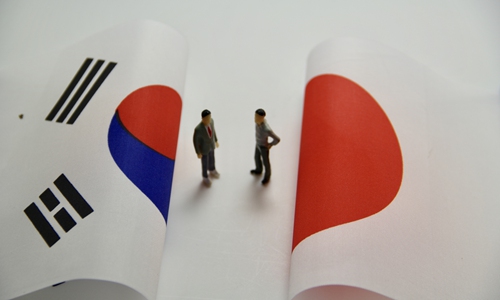HOME >> OPINION
US likely behind SK move to renew GSOMIA
By Chen Yang Source:Global Times Published: 2019/11/26 17:48:40

Photo: IC
Fresh tensions appeared Sunday between Japan and South Korea, after Seoul announced it would renew the General Security of Military Information Agreement (GSOMIA) with Tokyo, which was originally set to end on midnight Saturday.Seoul accused Tokyo of deliberately distorting the details of South Korea's decision to keep in place the GSOMIA, and Tokyo denied on Monday it had offered an apology. The new dispute raised doubts whether Seoul's last-minute decision would help improve bilateral ties.
But from my perspective, although maintaining this military intelligence-sharing pact is far from bringing Japan-South Korea ties back to normal and settling fundamental contradictions between the two sides, it is at least a positive sign.
It has been reported that foreign ministers of the two Northeast Asian nations agreed Saturday to arrange a meeting between Japanese Prime Minister Shinzo Abe and South Korean President Moon Jae-in in late December. This can be seen as a major development coming about as a result of the renewal of GSOMIA.
Seoul's decision can't be seen as a compromise with Tokyo. It is a result of tremendous pressure created by Washington to bring about a thaw among its major allies in the region. As the Japanese government has shown no sign to ease export restrictions against South Korea or to add South Korea back to its white list of preferred trading partners, many people in Japan believe the outcome proves that Japan has scored a diplomatic victory.
But in South Korea's final decision, US influence has played a key role. Several high-level US officials, including Defense Secretary Mark Esper, visited South Korea recently, ratcheting up pressure on the Blue House and hinting that terminating GSOMIA would harm the US-South Korea alliance. Moreover, the US Senate unanimously passing a resolution reaffirming the significance of GSOMIA on Thursday shows how important the issue is for Washington.
If the agreement between Japan and South Korea were terminated, the incident would have cast a shadow on trilateral relations among Washington, Tokyo and Seoul, and could have impacted US presence in Northeast Asia, which is the last scenario the US would like to see. So the US has drawn a clear bottom line: Maintaining the stability of military ties between Japan and South Korea and avoiding chaos in terms of US own strategic deployment in Northeast Asia.
South Korean strategy toward GSOMIA is to "retreat in order to advance." When the country's presidential office announced the renewal of the pact, it also emphasized Seoul's right to terminate it at any time.
The move showed some South Korean respect for the US while reminding Tokyo that it is Seoul which holds the initiative.
The Moon administration's decision on the GSOMIA went against mainstream public opinion in South Korea, and may affect the government's popularity. According to a Gallup Korea poll released Friday, 51 percent respondents were opposed to the renewal of GSOMIA while merely 29 percent supported it.
However, Seoul took the lead in making the utmost concession and avoiding further damage to its relationship with Tokyo. This will force Japan to respond, otherwise, Japan's image would have taken a beating among international public opinion.
Moreover, Japan's indifferent response may also hurt trilateral relations between Washington, Tokyo and Seoul. From this perspective, South Korea's concession does not mean that Japan has gained the upper hand in the standoff between the two countries.
While Washington was piling pressure on Seoul, it must have also exerted some pressure on Tokyo and urged the Abe administration to improve ties with Seoul. Therefore, some related response from Japan is likely to be seen in the near future. For example, at the two leaders' meeting in late December, it is possible that Japan might agree to relax semiconductor raw materials export restrictions on South Korea.
The renewal of GSOMIA has reduced tensions between the two countries but since the wartime forced labor issue lies at the root of their differences, bilateral ties cannot improve significantly now.
Nationalist sentiments in both Japan and South Korea are rising. Abe and Moon need to break the public's mind-set - according to which concession means weakness - and consider their overall interests. They also have to constantly publicize future-oriented diplomatic values to their people, which is a responsibility of politicians.
It is hoped that the two countries can cherish this opportunity and handle issues through dialogue and consultation, thus ending the dilemma and contributing to regional peace and development.
The author is a media professional and an observer of Japan issues. opinion@globaltimes.com.cn
Posted in: VIEWPOINT,ASIAN REVIEW